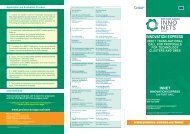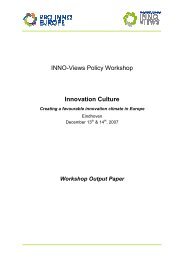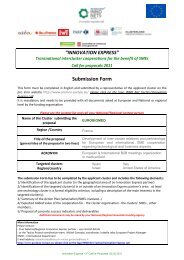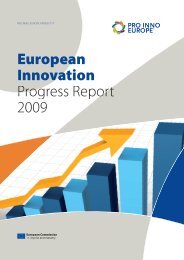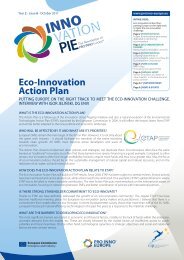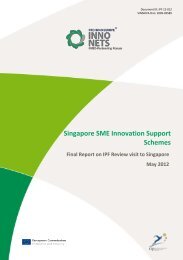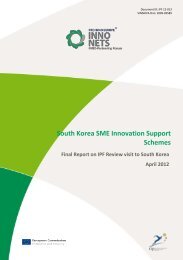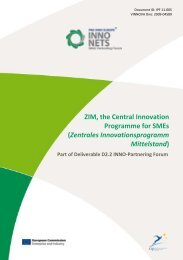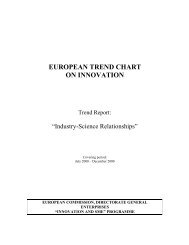Benchmarking National - PRO INNO Europe
Benchmarking National - PRO INNO Europe
Benchmarking National - PRO INNO Europe
Create successful ePaper yourself
Turn your PDF publications into a flip-book with our unique Google optimized e-Paper software.
important carrier in the field of IPR support. Bearing limitations regarding<br />
resources in mind, embedded services are mostly in a well-defined position to<br />
complement larger, national offerings, mainly by external referral and signposting<br />
activities on a regional level.<br />
5.4.4 Patent database and information search services<br />
Patent database search services are an important pillar of the public IPR support<br />
system for SMEs in a variety of countries (e.g., in Austria, The Netherlands, Denmark<br />
(over the website of the Danish Patent Office), in Italy or in Germany). In very small<br />
countries, such as Liechtenstein, patent search services offered by specialised<br />
departments of general-purpose libraries constitute even the main type of public<br />
support service available for SMEs in the field of IPR. Against this background, it<br />
seems important to take a closer look at the specific goals, the modes of operation<br />
and key success factors for such services.<br />
The usefulness of patent information and its under-usage by SMEs<br />
The main rationale behind offering patent database search services is, on the one<br />
hand, seen in the fact that unnecessary and redundant R&D can be avoided.<br />
According to the Austrian service serv.ip, for example, the patent office estimates<br />
that around € 150 mio are saved each year, because companies find out that what<br />
they were to research and/or patent was already invented. On the other hand,<br />
using patent information may also serve a number of other functions: In a study<br />
conducted by Hall, Oppenheim and Sheen ten motivations to use patent<br />
information–in addition to the avoidance of double research costs–were identified<br />
(Hall, Oppenheim & Sheen, 2003):<br />
1. For purely technical information/educational purposes<br />
2. For finding out if something is patentable<br />
3. For competitive positioning (in order to stay informed about what competitors<br />
do)<br />
4. To check for possible infringement (i.e., to check whether another company<br />
infringes a firm’s patent rights or whether the firm infringes another company’s<br />
patent rights)<br />
5. For finding new areas to get into and/or opportunities for licensing in<br />
6. For “inventing around” other patents<br />
7. For costing/pricing intelligence, in case information on production and/or<br />
operating costs can be derived from the patent filings (which is said to be often<br />
the case)<br />
8. For problem solving (in order to get ideas for solving similar problems inhouse)<br />
9. For information about manufacturing processes (processing generally entails a<br />
good deal of tacit knowledge which a company, even if it holds a patent, will<br />
try to keep to itself. Nonetheless, a lot of information about such processes can<br />
be found in patent databases)<br />
10. For improving the success rate of patent applications<br />
Despite of the benefits described, the – sparsely available – empirical data on this<br />
issue suggests that SMEs hardly use patent database search services. Evidence to<br />
this end has been collected by the Hall, Oppenheim & Sheen study. The study<br />
investigated the use of patent information with 390 SMEs in patent-affine industries<br />
in the UK. The findings indicate that 44 % of the enterprises never use patent<br />
information and 80 % of those companies that carry out searches do so only once<br />
a year or less frequently. A size effect was observed, i.e., larger firms had a higher<br />
propensity to conduct patent searches than smaller ones.<br />
Within the scope of the underlying benchmarking study, the usage of information<br />
channels utilised by users of IPR support services for innovative undertakings<br />
85<br />
TOWARDS GOOD PRACTICES – THE REAL WORLD OF IPR SUPPORT SERVICES





